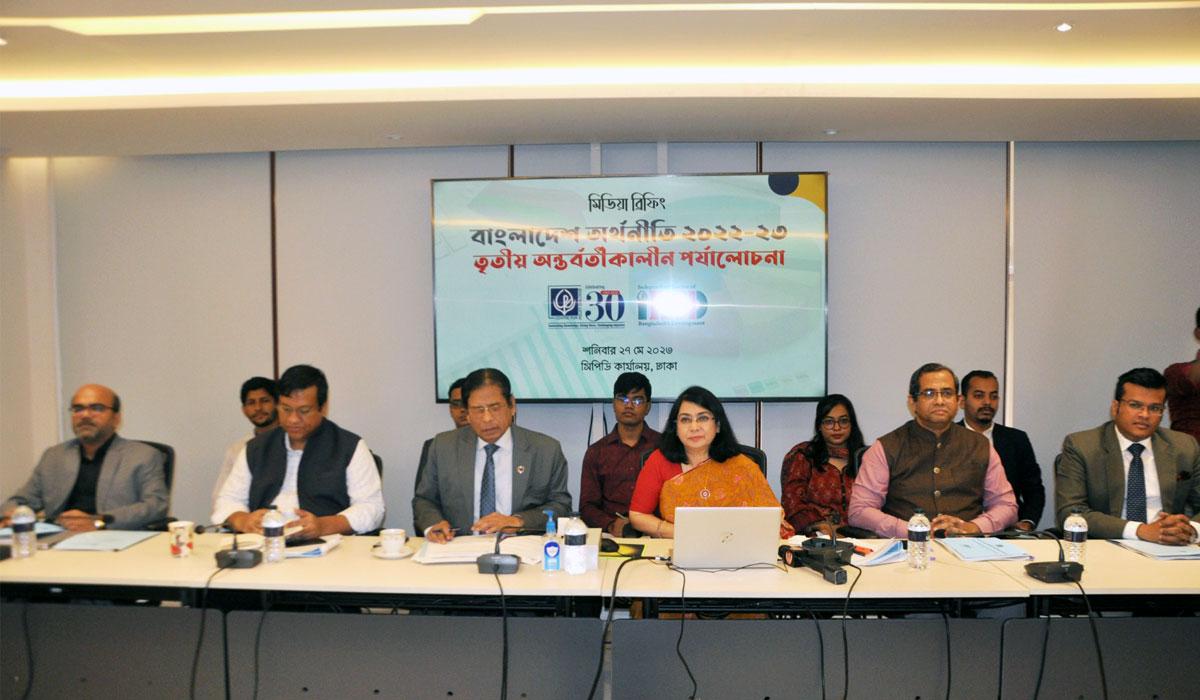
Download Presentation Download Paper
The economy of Bangladesh has faced multifaceted challenges due to COVID-19 and the Russia-Ukraine War, resulting in high global commodity prices, imported inflation, and supply chain disruptions. While these exogenous factors have definitely left their marks, endogenous factors such as embedded structural weaknesses, sub-optimal policies, lax implementation, poor governance, and inability to implement necessary reforms have further accentuated the difficulties.
The macroeconomic stress during FY2022-23 is visible through lower revenue mobilisation leading to a shrinking of the fiscal space, high reliance on borrowings from the central bank to finance budget deficits, tightened liquidity of scheduled banks, high prices of essentials and deteriorating external sector balance and foreign exchange reserves.
In view of the aforementioned challenges, the Bangladesh government has resorted to an International Monetary Fund (IMF) supported programme comprised of the Extended Credit facility (ECF), the Extended Fund Facility (EFF), and the Resilience and Sustainability Facility (RSF). The central focus of the IMF programme is to restore macroeconomic stability. The timeline of this programme coincides with the preparatory phase of Bangladesh’s graduation from the least developed country (LDC) category, second half of the period to attain the sustainable development goals (SDGs) and final budget of the ruling government as it prepares for the upcoming election.
As experience shows, restoring macroeconomic stability based on predetermined conditions requires making hard choices and imposes limitations on policy manoeuvring. In hindsight, the prescribed stabilisation packages of the multilateral agencies to the developing countries had commonalities but revealed diverging effects in their outputs.
In this backdrop, the four critical issues that demand urgent attention in the policy discourse are — maintaining fiscal balance, improving external sector equilibrium, containing inflation and ensuring food security. These have been focused based on their significance in restoring macroeconomic stability, disciplining macroeconomic management and identifying development priorities.
The above-mentioned observations emerged at a media briefing titled ‘State of the Bangladesh Economy in FY2022-23 (Third Reading)’ on Saturday 27 May 2023, organised by the Centre for Policy Dialogue (CPD) under its flagship programme Independent Review of Bangladesh Development (IRBD). Dr Fahmida Khatun, Executive Director of CPD, gave her welcome remarks and delivered the keynote presentation.
In her presentation Dr Khatun said, ‘The Bangladesh economy is at a crossroads and passing through the most difficult time in recent history. This must be recognised and addressed by appropriate policy tools’. In view of the emergent scenario and keeping in perspective the upcoming national budget, there is no doubt that the primary task before the policymakers is to restore macroeconomic stability. The targets to be set for the macroeconomic and fiscal framework for FY2023-24 will need to take cognisance of the current realities. The mistakes while preparing the FY2022-23 budget — that is, setting the targets for major macroeconomic correlates in an unrealistic manner —must not be repeated.
‘While the fiscal and budgetary measures are expected to be at the centre of discussions in the coming days, it is critical that the government and the central bank ensure the complementarity between fiscal and monetary policies’, said the Executive Director.
CPD urged that the policy measures must prioritise the interests of the small and medium entrepreneurs and common citizens while withstanding the pressure of the vested interest groups.
Keeping the IMF conditionalities in perspective and national interests in mind, reform measures should be initiated and expedited. However, the pacing, sequencing and phasing of these reform measures should be well-planned and transparent. Proper enforcement of laws and regulations against bank loan defaulters must be ensured. Instead of incentivising illicit financial flows and illegally earned money through direct and indirect measures, strict administrative steps and punishment should be imposed as per existing laws.
An open-floor Q&A session with journalists from both print and electronic media followed the presentation.
Professor Mustafizur Rahman, Distinguished Fellow, CPD addressed the inquiries and said that effective management of foreign exchange reserves is currently a pressing concern. To this end, he emphasised the need for market aligned exchange rate .
‘The government must assess the effectiveness of their initiatives aimed at achieving macroeconomic stability and identify areas for improvement in their plans’, said Dr Khondaker Golam Moazzem, Research Director, CPD.
Mr Towfiqul Islam Khan, Senior Research Fellow, CPD, highlighted the lack of clarity regarding the adjustment of fuel prices. He said that there is a scope of reducing the fuel prices by 5 – 10 takas per litre. The longer the delay in implementing this fuel price reduction, the greater the profit earned by Bangladesh Petroleum Corporation (BPC), which comes at the expense of consumers.
The media briefing concluded with closing remarks from the Executive Director.

